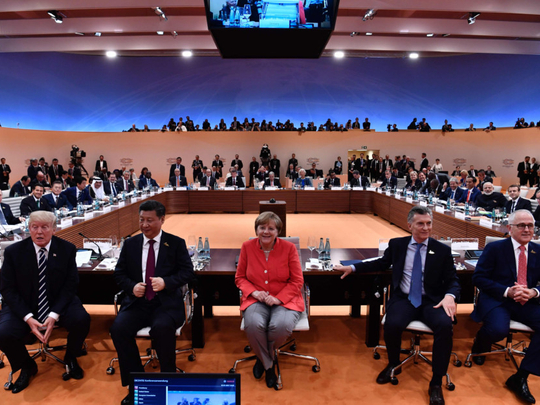
The G20, the club gathering of the world’s biggest economies, is the offspring of two crises. First, the 1997 Asian financial crisis led to the creation of the group in 1999 as an annual summit for finance ministers and central bank governors. Their objective was to coordinate policies to stabilise and stimulate the global economy.
But it was the global financial crisis of 2008 that forced the group to transform its annual gatherings into an assembly for heads-of-state. Their goal remained the same, only with increased urgency, given the severity of this second crisis.
The upgrade was the initiative of the then United States president George W. Bush, and it was carried on by his successor, former president Barack Obama, who was in fact so enthusiastic about the G20 that he played an essential role in the approval, at the 2009 summit in London, of a $1.1 trillion (Dh4.04 trillion) stimulus programme — the equivalent of almost two-thirds of the entire Brazilian economy.
With such a history, it’s only natural that a shadow was cast over this year’s summit, in Hamburg, Germany, by US President Donald Trump. There looms the threat of seeing the country that’s been the singular champion of globalisation suddenly retreat into an “America First” mentality — the antithesis of the kind of open trade and policy coordination that’s in the G20s DNA.
The fact that Trump announced America’s withdrawal from the Paris climate accord, the most comprehensive agreement ever reached to limit global warming, is evidence that Washington is creating a void in the leadership of global governance. And since in politics voids are inexorably filled, the G20 in Hamburg will be, beyond the issues on the agenda, about looking for alternatives.
Not that anybody can claim to be in a position to replace the US. Trump or no Trump, America’s importance is unmatchable. You only need to look at the per capita gross domestic product: $57,436 in the US compared to, for example, $15,399 in China, which is regularly hailed as the country is poised to overtake America.
What experts have instead begun to envision is the emergence of one or several countries capable of countering America’s current isolationism.
Sook-Jong Lee, president of the South Korean East Asia Institute, puts it this way: “Now is the time for other major countries to provide additional leadership in response to numerous transnational challenges, including peace and security, terrorism, refugees and environmental problems.”
The paradoxical aspect of this moment is that China, a “closed country”, is presenting itself as the champion of globalisation, as the counterweight against an inward-looking America. “China would like to see G20 countries work together to contain anti-globalisation sentiment,” says Ye Yu, from the Institute for World Economy Studies in Shanghai. Clearly, because it took place in Europe, this year’s G20 is also an opportunity for the continent, reinvigorated after the populists’ recent electoral defeats in certain European countries, to become the world’s first reference for multilateralism.
Surprisingly, in this time of readjustment, Brazil, an emerging economy, which never was truly a candidate for such a kind of leadership, is in no position to even take part in the debate. The reason, of course, is that the government is too busy devoting its energy and ideas to nothing but its own survival.
— Worldcrunch, 2017, in partnership with Folha de Sao Paulo/New York Times News Service
Clovis Rossi is a columnist for Folha de Sao Paulo and a member of its editorial board.









